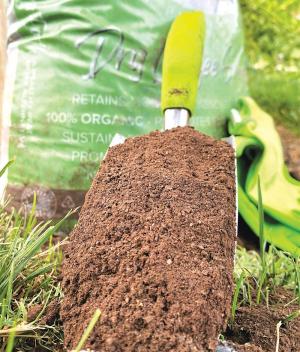2022 - Volume #46, Issue #5, Page #27
[ Sample Stories From This Issue | List of All Stories In This Issue | Print this story
| Read this issue]
Coffee Grounds Used To Boost Soil Fertility & More
 |
“We work with large coffee producers like Nestle and Starbucks to create retail products from the grounds that are the byproduct of brewing,” says Ian Kennedy, SRG. “Coffee grounds have a heating value close to anthracite coal. They’re 5 to 10 percent oil, which we extract and make into an extremely competitively priced lubricant. Our heating pellets have an extremely low ash content, and our grilling pellets are like charcoal with a hint of java.”
Some aspects of the coffee ground products are superior to competitive products. Compared to hardwood, SRG’s JavaBrewBQ grilling pellets and JavaFlame fuel pellets release 35 percent more Btu (11,170 versus 8,100 Btu per lb.), around half the moisture, and 80 percent less ash. The suggested retail price of the grilling pellets is $19.95 for a 20-lb. bag, similar to major retail charcoal brands.
“From a Btu standpoint alone, it’s like getting a third more pellets for the same price,” says Kennedy.
The coffee-based lubricant is being marketed as a replacement for vegetable oil in pelletizing processes. SRG’s marketing study suggests it has an equal value at less cost to soy oil and other vegetable oils.
JavaEarth has similar water retention and nutrient qualities to sphagnum peat moss. SRG’s agronomists have shown it’s as beneficial to compacted clay soils as it is to loose, sandy soils. It’s marketed through Walmart at $29.95 for a 20-lb. bag.
“JavaEarth lightens heavy soils, retains moisture and nutrients, and promotes strong root development,” says Kennedy. “Unlike peat moss, JavaEarth is environmentally sustainable. Instead of being dug out of the earth, it’s diverted from landfills. In addition, it’s at least comparable and often substantially cheaper than peat moss.”
SRG plans to offer JavaEarth in multiple product forms for various markets and uses. Consumers are advised to use it to improve native soil structure, mix it with potting soil for acid-loving plants and blend it with potting soil and pH balancers for starting seeds.
“Coffee grounds are considered the second largest natural waste source in the world,” says Kennedy. “We turn them into products people can use.”
Contact: FARM SHOW Followup, Sustainable Resources Group, 132 Veterans Lane, Unit A, Doylestown, Penn. 18901 (ph 610-840-9200; king@sustainableresourcesgroup.com; www.sustainableresourcesgroup.com).

Click here to download page story appeared in.

Click here to read entire issue
To read the rest of this story, download this issue below or click here to register with your account number.




